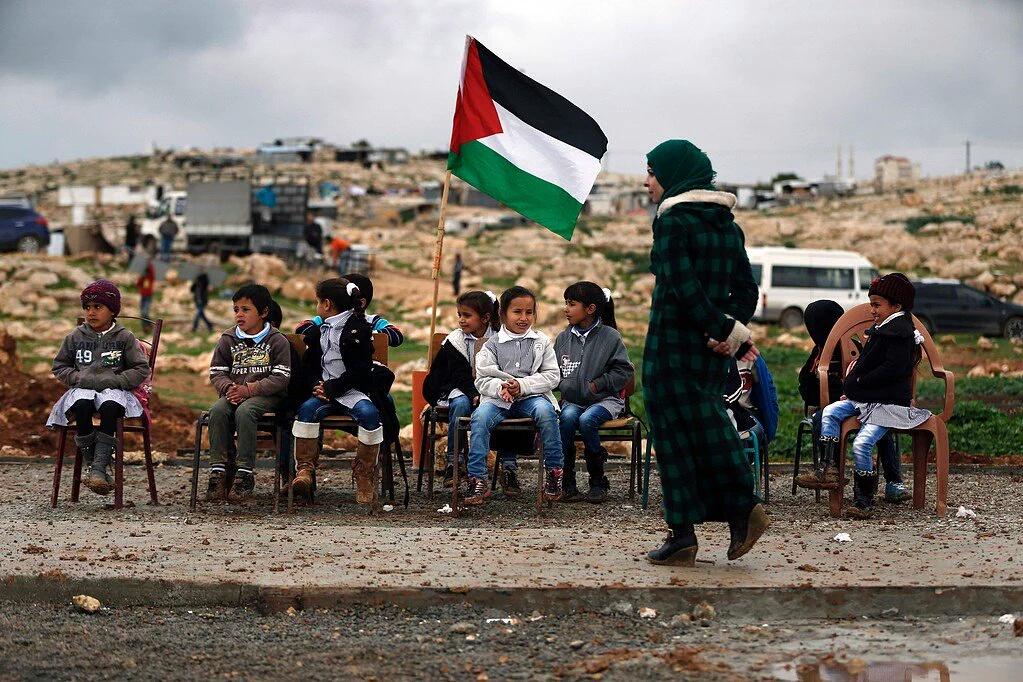The last week has seen continues mobilization, starting with the launch of Israeli Apartheid Week in Palestine to the continues struggle of the Palestinian teachers for their rights. Hunger striking journalist Mohammad al-Qiq has achieved a victory – on May 21st he will be released – while Israel continues waves of new arrests and the ethnic cleansing.
Teachers Protest continue
For the second time in a few weeks, a huge demonstration was organized by the Teacher Labor Union in Ramallah. About 10 000 people gathered to protest against the failure of the Palestinian Authority to fulfil the commitments they have taken with the professors.
In 2013, the government had accepted the demands of the Labor Union of the Professors. These demands aim at the equality between the employees of the government, because the professors are the only ones that don’t benefit from an increase in the basic salary, as well as the free access to university for their children.
The numbers at this renewed protests are all the more impressive, considering the Palestinian Authority has done their best to stop the professors from reaching Ramallah. The Palestinian Authority had de facto set up checkpoints around Ramallah to stop the buses of the demonstrators.
Hunger striker Mohammed Al-Qiq
The journalist, who was on his 94th day of hunger strike, accepted an offer by the Israeli authorities. He is going to eat again. After several months of refusal, both parties got an agreement on a release date, May 21st. Israel, however, maintained the right to extend the detention. Al Qiq will stay in administrative detention in the meantime, with a right of access to his family.
House Demolitions: Ethnic Cleansing Continue
On February 23rd, Israeli forces proceeded with the destruction of two inhabited houses, in the region of Hebron, expelling 18 people among whom 11 children. Two days later, near Ramallah, in the village of Ni’lin, about ten commercial structures belonging to Palestinians including a small carpentry shop, a glass shop and three garages were demolished, affecting 94 people.
The students of Abu-Nawar, the hamlet which had its only school demolished last week, found themselves once again without roof to attend their classes. Indeed, the soldiers seized both tents which served as refuge for the classes.
Al-Aqsa holy site : Zionist provocation and repression
The Occupation has been particularly aggressive on the holy islamic site this week. It started on Thursday afternoon, when Israeli colonists invaded during the prayer the Al-Aqsa mosque. Accompanied by heavily armed soldiers, they offended and mocked the worshipers who were there and they entered the mosque to provoke clashes. The Muslim community is denouncing since quite a while the reality of almost daily provocations by the Zionist settlers.
In reply, thousand of Palestinians came on the site for the Friday prayer.
A similar invasion repeated itself on February 28th, when Israeli groups entered again, protected by police, on the Islamic site.
On Monday on February 29th, another Israeli group came to the place of Al-Aqsa, heavily escorted. They tried to proceed to celebrate Talmudic rites while the soldiers held the Muslim worshippers at gunpoint.
Israelis Settlers : Pressure builds up
Extremists Jewish settlers organized a march on Wednesday against the Palestinians in the area of Masafer Yatta, south of Hebron. Rateb Al-Jabour, the coordinator of popular committees in Yatta, said that dozens of fanatic settlers escorted by police forces walked towards Palestinian houses, in Al-Fakhit and Al-Majaz, chanting insults. The settlers had Jewish religious flags and sang slogans calling for the murder of the Arabs and the claiming of Palestine as land of Israel. Rateb warned that these marches would lead to an increase in the attacks against the Palestinians and their property.
Wave of arrests in the West Bank
The Israeli forces arrested hundred people and about ten children during the week. Cities and villages of Beit Ummar, Jerusalem, Beit Furik, Surif and Salfit were particularly affected. The soldiers stormed homes in these places during the night or very early in the morning.

